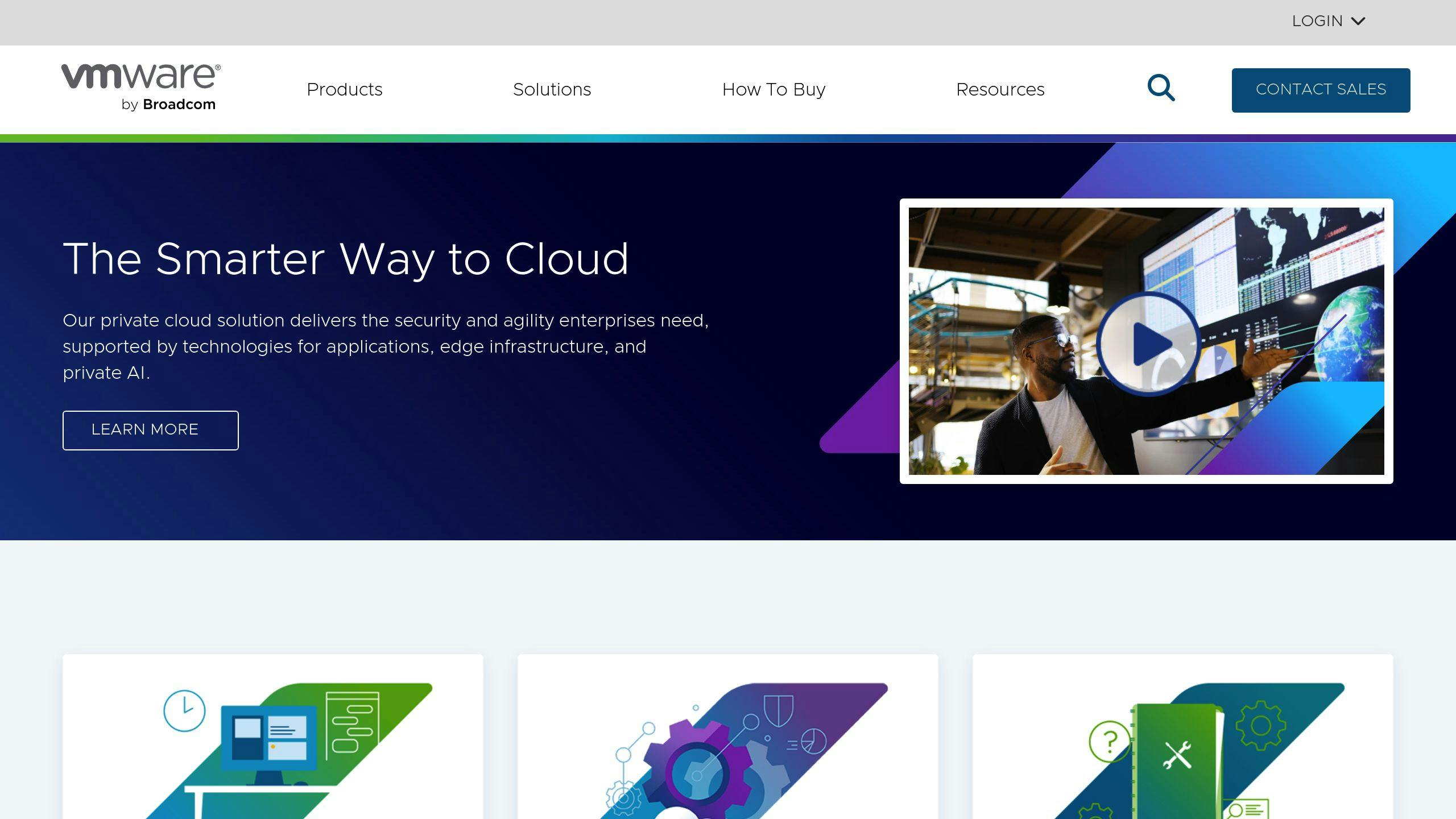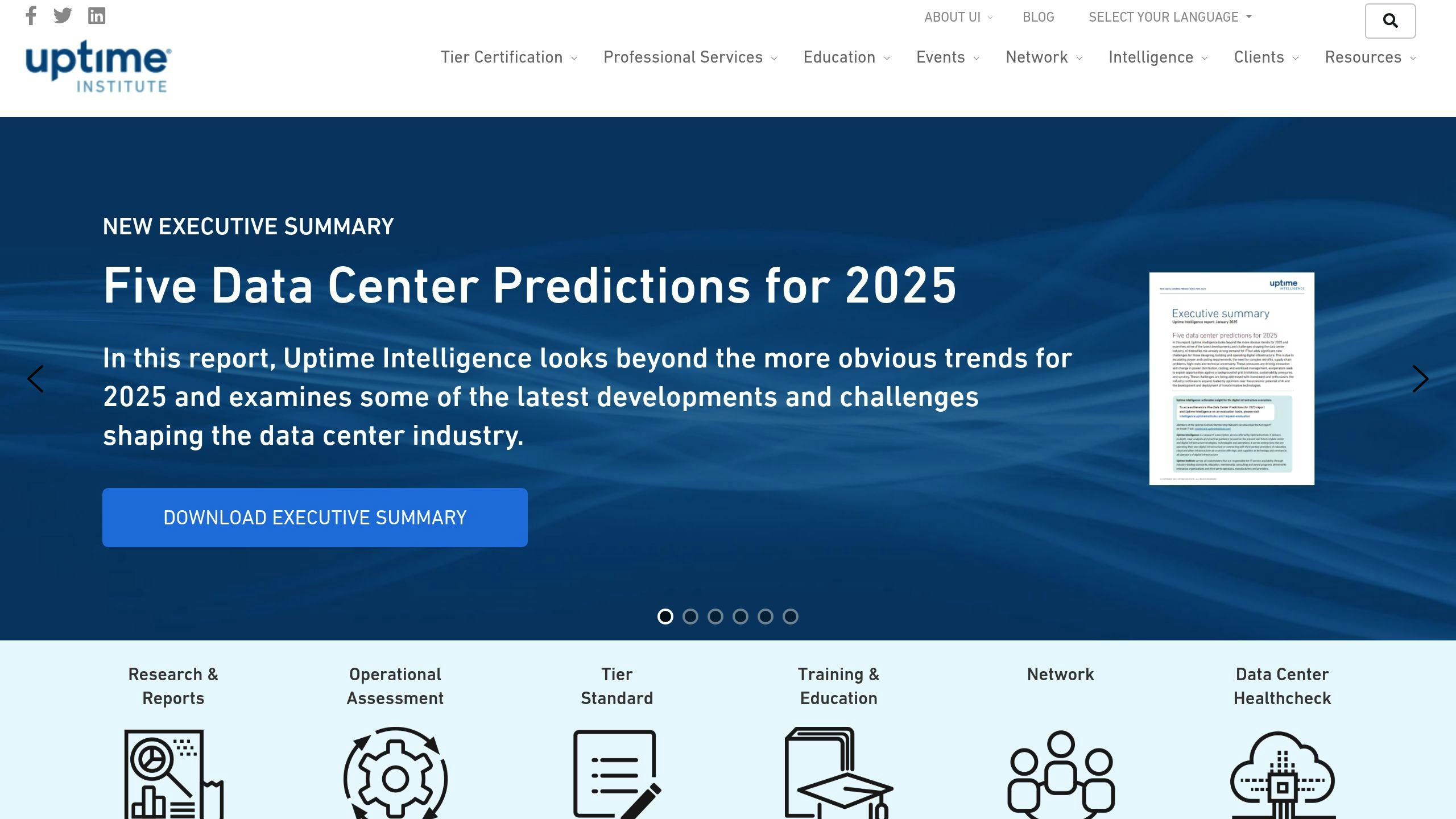Looking to boost your career in the growing data center industry? Certifications are a proven way to gain specialized skills, stay competitive, and unlock higher-paying roles. Below are the top 5 data center certifications to consider:
- CCNA Data Center: Ideal for beginners, covering networking, storage, and automation basics. Cost: ~$300.
- CDCP (Certified Data Centre Professional): Focuses on operations, energy efficiency, and management. Cost: $1,500–$3,000.
- VCP-DCV (VMware Certified Professional - Data Center Virtualization): Specializes in VMware vSphere and virtualization. Cost: ~$225.
- ATS (Accredited Tier Specialist): Emphasizes reliability, tier compliance, and operational excellence. Valid for 3 years.
- DCDC (Data Center Design Consultant): Tailored for infrastructure design and energy-efficient systems. Requires 2+ years of experience.
Quick Comparison
| Certification | Focus Area | Cost | Validity | Ideal For |
|---|---|---|---|---|
| CCNA Data Center | Networking & Automation | ~$300 | 3 years | Entry-level professionals |
| CDCP | Operations & Energy Efficiency | $1,500–$3,000 | 3 years | Operations managers |
| VCP-DCV | Virtualization (VMware) | ~$225 | 2 years | Virtualization engineers |
| ATS | Reliability & Standards | Varies | 3 years | Facility operations leads |
| DCDC | Design & Planning | Varies | Varies | Designers & planners |
These certifications cater to various roles and expertise levels. Choose one that aligns with your career goals and stay ahead in the rapidly evolving data center field.
Top 4 Data Center Certifications
1. Cisco Certified Network Associate (CCNA) Data Center
The CCNA Data Center certification is designed for professionals starting out in data center operations. Offered by Cisco Systems, it focuses on the core skills needed to manage today's data center environments.
Key topics in the curriculum include:
- Basics of data center infrastructure, networking, and storage
- Unified computing systems and virtualization concepts
- Automation and orchestration in data centers
- Cisco's ACI platform for network automation
To earn this certification, candidates must pass two exams: 200-150 DCICN (Networking) and 200-155 DCICT (Technologies). While there are no mandatory prerequisites, Cisco suggests having 1–3 years of experience in networking or data center operations [1]. The certification is valid for three years, after which recertification requires passing an updated exam [2].
Professionals with the CCNA Data Center certification typically earn between $55,000 and $137,000 annually, depending on their role and experience level [3]. Additionally, job satisfaction among certified individuals is high, with an average rating of 4 out of 5 [2].
The exam emphasizes networking, security, and automation basics, reflecting the industry's shift toward automation and virtualization. This certification equips professionals with the skills necessary to address these evolving demands.
For those looking to grow further in the field, the CCNA Data Center certification serves as a pathway to advanced certifications like CCNP and CCIE. With a cost of around $300 plus tax, it’s an investment that can significantly boost career prospects in the fast-changing data center industry [4].
If you're interested in deepening your skills in virtualization, VMware's VCP-DCV certification is a strong next step.
2. Certified Data Centre Professional (CDCP)
The CDCP certification helps professionals gain essential skills for managing data centers effectively. As data centers become increasingly intricate, CDCP stands out by preparing individuals to handle a wide range of operational challenges, unlike the more network-specific CCNA Data Center certification.
The program covers key areas like data center design, power and cooling systems, aligning IT with business needs, security measures, and energy-efficient practices. It includes a five-day course along with 20 hours of online tutoring. While there are no formal prerequisites, having at least two years of experience can be helpful.
| Aspect | Details |
|---|---|
| Duration | 5-day course + 20 hours online tutoring |
| Validity | 3 years |
| Renewal Requirements | Continuing Professional Development (CPD) credits |
| Cost | $1,500 - $3,000 |
This course provides practical knowledge to boost operational efficiency, enhance security, and align technical systems with business objectives. Its emphasis on energy efficiency and eco-friendly practices makes it especially relevant in today’s environmentally conscious world.
For those looking to deepen their expertise, CDCP serves as the starting point for advanced certifications like CDCS and CDCE. This structured path allows professionals to gradually expand their knowledge while advancing their careers.
Additionally, CDCP-certified professionals are well-prepared to implement energy-saving practices, meeting the growing industry demand for sustainable operations. For those interested in virtualization, the VMware Certified Professional - Data Center Virtualization (VCP-DCV) certification offers a specialized alternative.
3. VMware Certified Professional - Data Center Virtualization (VCP-DCV)

The VCP-DCV certification is a key credential for professionals managing virtualized data centers. With more organizations moving to cloud-based infrastructures, this certification highlights expertise in VMware vSphere technologies. It equips IT professionals to handle the challenges of modern virtualization in data centers.
This program covers critical skills like vSphere installation, configuration, and advanced features such as vMotion. These skills are essential for keeping virtualized environments efficient and reliable.
| Component | Details |
|---|---|
| Prerequisites | 6 months of vSphere experience |
| Training | VMware-authorized course required |
| Exam Cost | $225 |
| Exams | Two exams required |
| Validity | 2 years |
The certification blends theoretical knowledge with hands-on practice. VMware offers flexible training options, including classroom sessions and boot camps, making it easier to fit learning into busy schedules.
What makes VCP-DCV stand out is its focus on real-world application. The certification proves that a professional can:
- Fine-tune vSphere environments for top performance
- Use advanced virtualization features effectively
- Solve complex infrastructure problems
- Manage storage and network resources efficiently
To help candidates prepare, VMware provides a free trial of their vSphere environment, offering practical experience before taking the exams.
Earning the VCP-DCV certification can lead to roles like virtualization engineer or cloud infrastructure manager. For those interested in designing data center infrastructure, the Uptime Institute Accredited Tier Specialist (ATS) certification is another option worth exploring.
sbb-itb-d22037a
4. Uptime Institute Accredited Tier Specialist (ATS)

The Uptime Institute Accredited Tier Specialist (ATS) certification is a key credential for data center professionals focused on reliability and efficiency. Recognized worldwide, it confirms expertise in designing and managing data centers based on the Uptime Institute's Tier Classification System.
With the growing reliance on virtualization and cloud-based systems, ATS-certified professionals are essential for maintaining smooth operations. The program covers a wide range of data center operations:
| Core Components | Focus Areas |
|---|---|
| Infrastructure Design | Tier compliance and system topology |
| Mechanical Systems | Cooling infrastructure and performance |
| Electrical Systems | Power distribution and redundancy |
| Operational Excellence | Maintenance and fault tolerance |
| Sustainability | Reducing energy use and environmental impact |
To earn this certification, candidates must complete training, pass an exam, and have relevant work experience. Valid for three years, the certification emphasizes practical skills. For example, a European data center reported a 45% drop in operational incidents after adopting ATS-recommended practices.
Professionals with ATS credentials often step into senior roles such as:
- Data Center Operations Manager
- Infrastructure Design Specialist
- Facility Operations Director
- Technical Operations Lead
This certification prepares professionals to:
- Design systems with redundancy to maximize uptime
- Implement effective cooling solutions
- Manage power distribution efficiently
- Develop maintenance plans to reduce downtime
- Establish operational practices that prioritize sustainability
As businesses expand their digital infrastructure, the need for ATS-certified experts is growing, especially in areas like Singapore, Dublin, and Northern Virginia. The training includes hands-on exercises and real-world scenarios to ensure skills are directly applicable.
For those interested in design and consulting roles, the BICSI Data Center Design Consultant (DCDC) certification serves as an excellent complement to ATS.
5. BICSI Data Center Design Consultant (DCDC)

The BICSI Data Center Design Consultant (DCDC) certification is tailored for professionals specializing in data center design and construction. As organizations seek efficient and eco-conscious infrastructure, this certification meets the demand for scalable and environmentally friendly data center solutions.
The program combines essential design components with real-world applications:
| Design Component | Focus Areas |
|---|---|
| Infrastructure Planning | Site selection, capacity planning, scalability |
| Mechanical Systems | Cooling solutions, environmental controls |
| Electrical Systems | Power distribution, backup systems |
| Construction Methods | Implementation standards, best practices |
| System Integration | Network architecture, connectivity solutions |
To earn the DCDC certification, candidates need at least two years of experience in data center design or related fields. The process includes completing a rigorous course and passing an exam administered by BICSI [4].
Unlike certifications such as CDCP and ATS, which focus on operations, the DCDC emphasizes design. This approach ensures environmental and efficiency considerations are built into the foundation of a project, rather than added later.
Holding this certification can lead to specialized roles in data center design, planning, and management. Its value lies in covering both core principles and forward-thinking design strategies.
BICSI regularly updates the certification to reflect industry trends, helping professionals stay current on developments like edge computing and modular design. This ensures DCDC-certified individuals are prepared to tackle both emerging technologies and established design challenges.
Conclusion
The data center industry is evolving quickly, making certifications a key asset for professionals aiming to stay competitive. Each certification focuses on specific aspects of data center operations, offering tailored career pathways.
Here’s a quick comparison of popular certifications and their career focus:
| Certification | Career Focus | Key Role |
|---|---|---|
| CCNA Data Center | Infrastructure & Networking | Ideal for administrators managing equipment and maintenance |
| CDCP | Operations & Management | Builds a strong foundation in data center operations and best practices |
| VCP-DCV | Virtualization | Perfect for those working with VMware vSphere environments |
| ATS | Reliability & Standards | Suited for facility operations and ensuring tier compliance |
| DCDC | Design & Planning | Focused on professionals in data center design and construction |
These certifications cater to a range of roles - from networking and operations to design and virtualization. For entry-level professionals, CCNA Data Center is a great starting point, covering infrastructure, networking, and storage networking topics comprehensively [1][2].
While certifications require time and financial commitment, they often lead to strong career growth. For example, the BICSI DCDC certification is ideal for those interested in design, offering expertise in scalable infrastructure and energy-efficient solutions [4].
To make the most of your certification journey:
- Align the certification with your current role and career goals.
- Verify its industry recognition and relevance.
- Understand the prerequisites and time needed for completion.
- Ensure it matches emerging technology trends.
As the global data center market grows, certifications stand out as a mark of expertise. They showcase your technical skills in a field that requires constant learning and hands-on experience. Staying certified and up-to-date will be essential for long-term career growth in this ever-changing industry [4].
FAQs
Which certification is best for data center?
The best data center certification depends on your career stage and area of focus. For those starting out, CCNA Data Center is a great choice, offering essential knowledge in networking and data center infrastructure [1].
| Career Focus | Recommended Certification | Key Focus Area |
|---|---|---|
| Entry-Level | CCNA Data Center | Networking basics |
| Infrastructure Design | BICSI DCDC | Optimizing system design |
| Virtualization | VCP-DCV | VMware and virtualization skills |
| Operations | CDCP | Managing data center operations |
| Reliability | ATS | Understanding tier compliance |
As you gain experience, you might find other certifications more aligned with your growing expertise and industry requirements.
What is the best data center certification?
The "best" certification really depends on your role and the needs of your organization. For professionals with at least two years of experience, the Certified Data Centre Professional (CDCP) stands out. It covers a wide range of data center operations and management practices [4].
If virtualization is your focus, the VMware VCP-DCV certification is highly regarded, reflecting the increasing importance of virtualization in today’s data centers [4]. For those involved in facility operations, the Uptime Institute Accredited Tier Specialist (ATS) certification is well-suited, emphasizing reliability and operational efficiency [4].
Choosing the right certification comes down to your specific job responsibilities and the challenges your organization faces.

